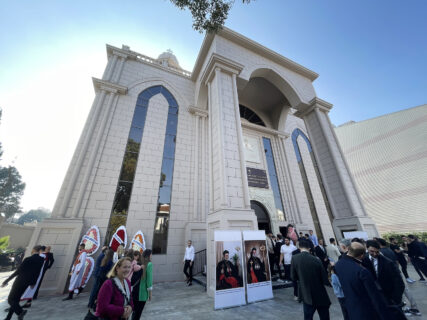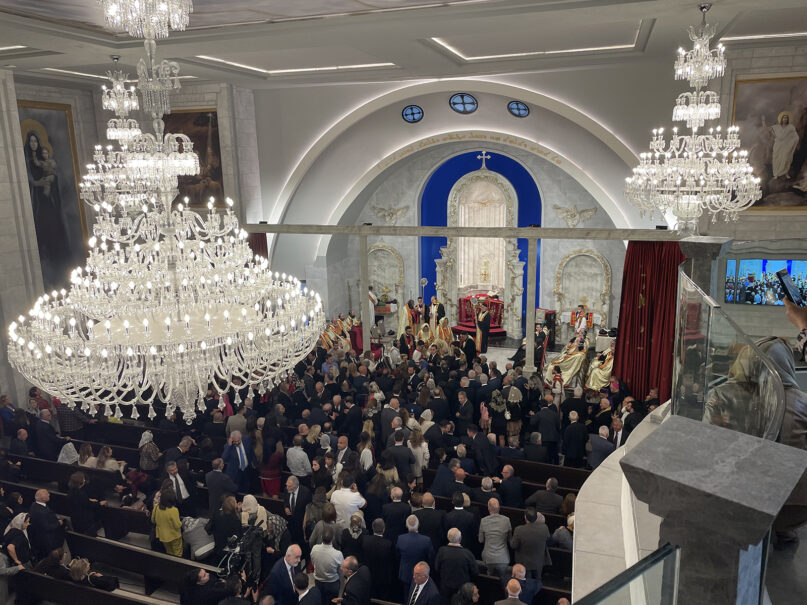ISTANBUL (RNS) — On Oct. 15, hundreds of Turkey’s Assyrian Syriac Christians gathered in Istanbul’s leafy Yeşilköy neighborhood to witness the inauguration of Mor Ephrem Syriac Orthodox Church, the community’s first new church in more than a century.
A generation ago, the vision of building a new Syriac Christian church in Istanbul would have been a fantasy. One of the oldest branches of the church, Syriac Orthodox Christianity still uses a dialect of Aramaic, the language of Jesus and his disciples, for its liturgy. “We’re a very ancient people, a Mesopotamian people,” said Katia Arslan, an Assyrian who studies Turkey’s minority peoples.
But today only about 25,000 Assyrian Christians live in Turkey, represented across the Syriac Church, the Assyrian Church of the East and Latin Uniate Churches adhering to Rome, but most are Syriac Orthodox.
They are the last remnant of a community that once numbered in the hundreds of thousands in Turkey’s southeast but faced genocide at the close of the Ottoman Empire. Further persecution in the early days of modern Turkey kicked off a mass emigration abroad or to western Turkish cities. During the exodus, the state expropriated Assyrian properties, including churches and monasteries.
But at the inauguration of the new Istanbul church this month, the Syriac metropolitan of Istanbul, Ankara and Izmir, Yusuf Çetin, was met with cheers and ululation from the crowd as he anointed the church’s gates and recited a prayer.
As important, and perhaps more surprising, the previous Sunday, President Recep Tayyip Erdoğan, who has done much to make Islam part of the Turkish identity, made a visit to celebrate the church’s completion.
“The church we have built is a symbol of freedom of religion and belief in our country,” said the president. “At a time when divisions, conflicts and hate crimes based on religious and ethnic origin are increasing in our region and the world, this embracing attitude of Turkey is very important,” he said.
Erdoğan has had a complicated relationship with Turkey’s Christians since he rose to power in the late 1990s. While restoring Islam to the public sphere in Turkey after nearly a century of a firm policy of secularization by his predecessors, he has also allowed several churches and synagogues that the state had expropriated to reopen as museums and cultural centers or even as active houses of worship.
In 2019, when construction on Mor Ephrem began, Erdoğan laid the foundation stone.
“As a community, we believed in him and trusted his sincerity,” Metropolitan Yusuf Çetin told Turkish media at the Oct. 15 inauguration. “He honored not only Assyrians in Turkey, but also diaspora Assyrians.”
Özgür Kaymak, a lecturer in political science at MEF University in Istanbul, explained that AKP’s policies toward religious minorities are part of his government’s break with Turkey’s secularist past, but that they also reflect its political pragmatism.
David Vergili, editor of Sabro, a journal covering the Syriac diaspora, agreed. “We see clearly that the AKP is trying to benefit from the presence of the minorities, especially in periods of conflict and in the eyes of Western countries,” he told RNS.

The exterior of the new Mor Ephrem Syriac Orthodox Church, Sunday, Oct. 15, 2023, in Istanbul, Turkey. (RNS photo/David I. Klein)
Indeed, Mor Ephrem’s opening was celebrated not only by Syriac leaders but by other Christian sects: The church isn’t just the first Assyrian structure, but the first church of any sect to be built anew since the establishment of the Turkish Republic in 1923 — The republic’s early years were defined by policies of Turkification that resulted in the repression of ethnic and religious minorities in the name of shoring up a unitary, and nationalist, Turkish identity.
The Rev. Luka Refatti, the Dominican pastor of the Mary Queen of the Rosary Catholic Church, which stands near the Syriac church, stood alongside other clergy at the front of the church at Mor Ephrem’s inauguration.
For years, Refatti’s was one of several Christian congregations — Armenian and Greek Orthodox, Latin Catholics and others — to host the Assyrian community, which has only one existing church in Istanbul, located in the rougher Tarlabaşi neighborhood and far from where most of Istanbul’s 18,000 Assyrians are clustered.
“Now, for them, it is a new stage,” Refatti said. “I hope that this won’t just be a place to show and display their own identity, but also to pray and meet God. Not just for Syriac Christians but all denominations,” he added.
The new building, which can hold as many as 750 people for a service, is five stories tall and mixes modern construction with traditional Syriac styles. Its facade includes a sandstone design that echoes Syriac churches in Turkey’s southeastern Mardin province, a historically Syriac area, while the sanctuary is decked out with frescoes of early church figures such as its fourth-century namesake, Saint Ephrem the Syrian.
While the church is a happy turn of events for many Christians, some who have long tracked the affairs of Turkey’s religious minorities are skeptical. Successive Turkish constitutions have granted equal rights to non-Muslim minorities, Kaymak noted, but real equality seldom followed.
Erdoğan’s rapport with Christians has had its vagaries as well. Just a year after laying the foundation of Mor Ephrem, Erdoğan incurred the ire of the Christian world when he converted Hagia Sophia, a UNESCO World Heritage site that had been a center of both Byzantine Orthodox Christianity and Ottoman Islam, back into a mosque.
A month later, the ancient Chora Church/Kariye Mosque, which had been maintained neutrally as a museum since the founding of the Turkish Republic, also reverted to a Muslim sacred space. Greece’s foreign ministry called it “a provocation against all believers.”
The move wasn’t missed by the Syriac community, either.
“Converting Hagia Sophia in Istanbul and other churches in the country, the destruction of Christian heritage alongside long-held obstacles and difficulties for the ancient Christian communities in the country are real concerns for our people,” Vergili said.
The same week that Erdoğan attended the opening ceremony at Mor Ephrem, the European Court of Human Rights ruled that Turkey had violated the rights of the Assyrian community in a dispute over property owned by the Mor Gabriel Syriac monastery, in Turkey’s southeast.
In 2011, Turkey seized more than 60% of the monastery’s land. Much of it was returned in 2018 by the Turkish parliamentary measure that returned dozens of historic properties to the Syriac church, but one plot of land in the city of Mardin remains under dispute.
“The government’s approach to the Syriac community is a bit vague and ambiguous,” Arslan said. “On the one hand, in the southeast region, it has one politics, while in the western region, it has another.”
The 2021 arrest and imprisonment of a Syriac monk, Aho Bileçen, in southeastern Turkey also sparked protests from the Assyrian community worldwide.
For Christians of all kinds, Erdoğan’s policy toward minorities’ place in public life needs to restore respect for a truly pluralistic society as much as for church property.
“The protection and well-being of Syriac people and Christian communities need a long-term project in line with truth, transparency and democratic principles,” Vergili said.





